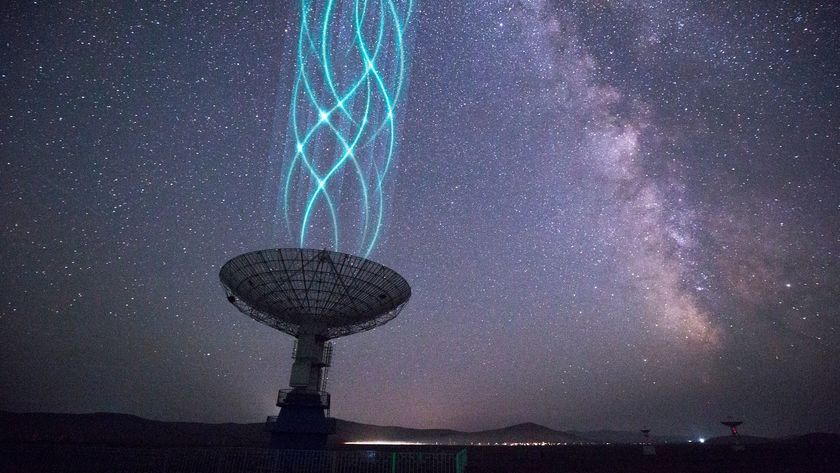Proof of Aliens Could Come Within 25 Years, Scientist Says
SANTA CLARA, Calif. – Proof of extraterrestrial intelligence could come within 25 years, an astronomer who works on the search said Sunday.
"I actually think the chances that we'll find ET are pretty good," said Seth Shostak, senior astronomer at the Search for Extraterrestrial Intelligence Institute in Mountain View, Calif., here at the SETI con convention. "Young people in the audience, I think there's a really good chance you're going to see this happen."
Shostak bases this estimation on the Drake Equation, a formula conceived by SETI pioneer Frank Drake to calculate the number (N) of alien civilizations with whom we might be able to communicate. That equation takes into account a variety of factors, including the rate of star formation in the galaxy, the fraction of stars that have planets, the fraction of planets that are habitable, the percent of those that actually develop life, the percent of those that develop intelligent life, the fraction of civilizations that have a technology that can broadcast their presence into space, and the length of time those signals would be broadcasted.
Reliable figures for many of those factors are not known, but some of the leaders in the field of SETI have put together their best guesses. Late great astronomer Carl Sagan, another SETI pioneer, estimated that the Drake Equation amounted to N = 1 million. Scientist and science fiction writer Isaac Asimov calculated 670,000. Drake himself estimates a more conservative 10,000.
But even if that lower value turns out to be correct, at the rate they're going, it wouldn't take scientists too long to discover an alien signal, Shostak said.
"This range, from Sagan's million down to 10,000 – that's the range of estimates from people who have started and worked on SETI," said Shostak. "These people may know what they're talking about. If they do, then the point is we trip across somebody in the next several dozen or two dozen years."
The SETI quest is set to take a leap forward when the Allen Telescope Array, a network of radio dishes under construction in northern California, is fully operational. By 2015, the array should be able to scan hundreds of thousands of stars for signs of extraterrestrial intelligence, Shostak said.
Sign up for the Live Science daily newsletter now
Get the world’s most fascinating discoveries delivered straight to your inbox.
But while humans might be able to discover an alien signal within that timeframe, interpreting what ET is trying to tell us could take much, much longer.
Shostak admitted such a task would be very difficult. An alien civilization may be as technologically advanced compared to us as Homo sapiens are to our hominid relatives Neanderthals.
"We could give our digital television signals to the Neanderthals, and they’ll never figure it out. And they're not stupid," he said.
Yet simply having proof that we are not alone in the universe would likely be a world-changing achievement, Shostak added.












